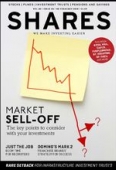Archived article
Please note that tax, investment, pension and ISA rules can change and the information and any views contained in this article may now be inaccurate.
Why you should stay calm amid stock market volatility

The decline in share prices around the world has dampened the spirits of many investors. In times like this, it is important to stay calm and consider the reasons behind the market sell-off.
You should ask whether the fundamentals have changed for your investments. If they haven’t, it’s probably best to do nothing. If they have, you need to do further research and ask whether you should still own that investment.
On one hand, global growth expectations have been upgraded this year which should be good news for corporate earnings and share prices. However, equity valuations have been high in many parts of the world – particularly the US – and so many observers have been expecting a pullback for some time.
WHY HAVE THE MARKETS WOBBLED?
Last week’s US jobs report spurred talk that the US economy may be strong enough to warrant acceleration in interest rate hikes. The jobs data led many investors to believe inflation could rise quickly this year as US tax cuts take effect and more companies start raising pay and prices.
You have to remember the stock market is forward looking and is pricing in potential events that may not happen for many months. A rapid acceleration in interest rates could cause consumers and businesses to cut back on their spending as borrowing costs would become more expensive, thereby damaging the economy.
Investors will now want guidance from the US Federal Reserve that rates aren’t going to go up quickly in order to feel more confident about the stock market.
WHY IS THE SELL-OFF GLOBAL?
The US has a major influence over what happens on markets around the world. Investors will now look to places like Germany and Japan to see what’s happening with their wage inflation. For example, German unions and employers agreed a deal on 6 February to lift wages for 900,000 employees in the metal and electric industries by 4.3%.
On a broader basis in Europe, there is an argument to suggest more jobs could be created without creating rampant wage or inflationary pressure, given that unemployment in the Eurozone is still at 8.7%. The European Central Bank has also given no indication that it is prepared to raise interest rates or bring its monetary stimulus programme to an end early.
WHAT HAPPENS NEXT?
Remaining invested in the market has historically been the best course of action if you’re a long-term investor. Stock markets have a tendency to recover faster than you think, although no one knows exactly when that recovery will happen.
It is also worth considering the scale of the latest market sell-off in the context of earlier gains. Many investors who have been in equities for the past two years should still be sitting on decent returns even after the latest market wobble.
For example, anyone investing in the FTSE 100 index would have made 24% return in the two years to 1 February 2018, being the night before the global sell-off began. Over the same time period, you would have made 59% from investing in the Dow Jones index.
Extending the holding period to early trading on 6 February (when this article was written) would have reduced those gains to 15.6% for the FTSE 100; and 39.7% for the Dow Jones.
The past week has been a long overdue reminder that markets move up AND down and investing in equities does come with risk attached. (DC)
Important information:
These articles are provided by Shares magazine which is published by AJ Bell Media, a part of AJ Bell. Shares is not written by AJ Bell.
Shares is provided for your general information and use and is not a personal recommendation to invest. It is not intended to be relied upon by you in making or not making any investment decisions. The investments referred to in these articles will not be suitable for all investors. If in doubt please seek appropriate independent financial advice.
Investors acting on the information in these articles do so at their own risk and AJ Bell Media and its staff do not accept liability for losses suffered by investors as a result of their investment decisions.
Issue contents
Big News
- BP wins the battle of the oil majors
- Shoppers keep calm and carry on
- Four important stories from the past week: Capita, Purplebricks, BT and Vodafone
- Ocado story sours again
- Tesco impresses with profit and dividend guidance
- Weighing up the impact of the market sell-off
- Why Royal Mail’s pension breakthrough is such a big share price catalyst

 magazine
magazine








